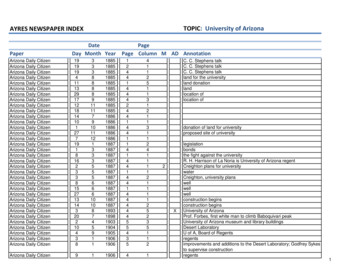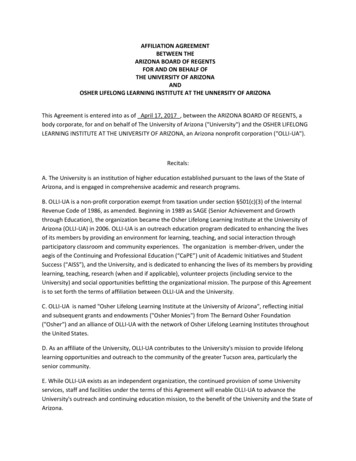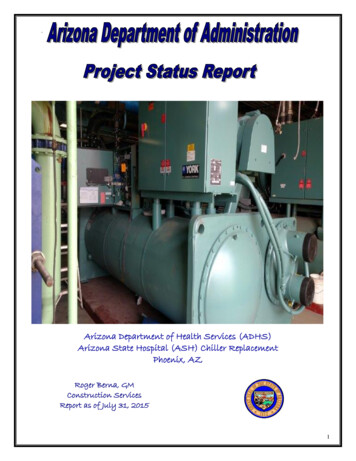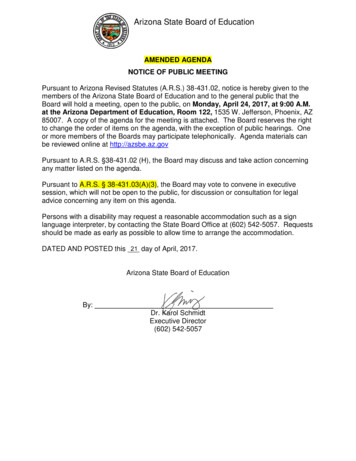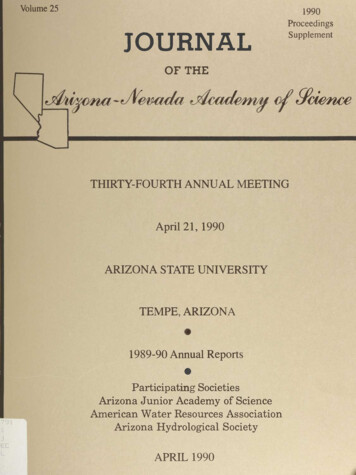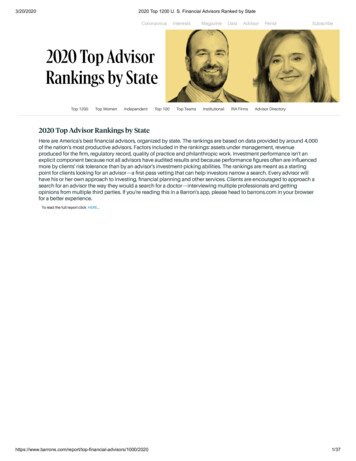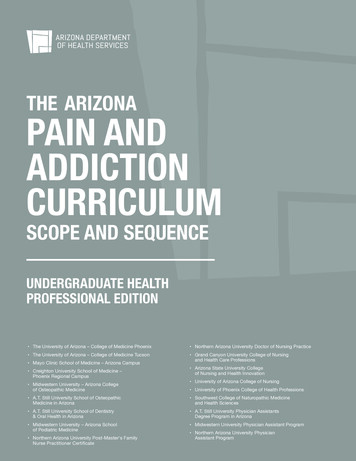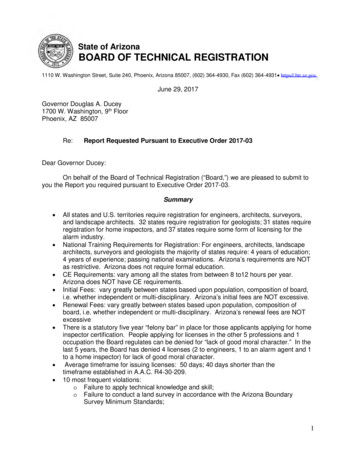
Transcription
State of ArizonaBOARD OF TECHNICAL REGISTRATION1110 W. Washington Street, Suite 240, Phoenix, Arizona 85007, (602) 364-4930, Fax (602) 364-4931 https//.btr.az.govJune 29, 2017Governor Douglas A. Ducey1700 W. Washington, 9th FloorPhoenix, AZ 85007Re:Report Requested Pursuant to Executive Order 2017-03Dear Governor Ducey:On behalf of the Board of Technical Registration (“Board,”) we are pleased to submit toyou the Report you required pursuant to Executive Order 2017-03.Summary All states and U.S. territories require registration for engineers, architects, surveyors,and landscape architects. 32 states require registration for geologists; 31 states requireregistration for home inspectors, and 37 states require some form of licensing for thealarm industry.National Training Requirements for Registration: For engineers, architects, landscapearchitects, surveyors and geologists the majority of states require: 4 years of education;4 years of experience; passing national examinations. Arizona’s requirements are NOTas restrictive. Arizona does not require formal education.CE Requirements: vary among all the states from between 8 to12 hours per year.Arizona does NOT have CE requirements.Initial Fees: vary greatly between states based upon population, composition of board,i.e. whether independent or multi-disciplinary. Arizona’s initial fees are NOT excessive.Renewal Fees: vary greatly between states based upon population, composition ofboard, i.e. whether independent or multi-disciplinary. Arizona’s renewal fees are NOTexcessiveThere is a statutory five year “felony bar” in place for those applicants applying for homeinspector certification. People applying for licenses in the other 5 professions and 1occupation the Board regulates can be denied for “lack of good moral character.” In thelast 5 years, the Board has denied 4 licenses (2 to engineers, 1 to an alarm agent and 1to a home inspector) for lack of good moral character.Average timeframe for issuing licenses: 50 days; 40 days shorter than thetimeframe established in A.A.C. R4-30-209.10 most frequent violations:o Failure to apply technical knowledge and skill;o Failure to conduct a land survey in accordance with the Arizona BoundarySurvey Minimum Standards;1
oooooooo20132014201520162017 Respondent signed and sealed professional documents not prepared by theregistrant or bona fide employeeRespondent failed to perform professional services after receiving payment;Submitting materially false statements and failing to disclose material factsrequested in connection with an application for licensure;Failure to conduct a home inspection in accordance with the Standards ofProfessional Practice for Arizona Home InspectorsAiding and Abetting an unregistered person to evade Board statutes;Failure to pay a collaborating registered professional within 7 calendar days afterreceiving payment from a client;Respondent engaged in the practice, offered to practice and advertised topractice a Board regulated occupation without registration with the Board;Gross negligence, incompetence, bribery or other misconduct in the practice ofthe profession.# ofComplaints# ofConsents# ofHearings Fines Fees17014914114411859616681602431110 44,600 102,500 91,897 110,100 102,700 13,789 27,300 35,525 40,907 29,822# of Nondisciplinaryresolutions109847252482017 complaints through May 30, 2017BackgroundThe Legislature created the Board of Technical Registration in 1921 to protect thepublic’s health, safety, and welfare by regulating the professions of architecture, engineering,land surveying and assaying. The Legislature added the profession of geology to the Board’sjurisdiction in 1956, and the profession of landscape architecture was added in 1968. In 2003,the Legislature added the occupations of Home Inspectors, Drug Laboratory Site RemediationFirms, Supervisors and Workers to the Board’s jurisdiction. The Alarm Industry, includingagents and firms, was added in 2013. At the Board’s request, the assaying profession, and theoccupations related to remediating contaminated properties were deregulated in 2016.The Board was created by the Legislature as an “independent” administrative agency,not subject to a superior head of a department, as opposed to a “subordinate” administrativeagency, whose actions are subject to administrative review or revision by the executive branch.2 AmJur 2d., Constitutional Law, § 27. Independent administrative agencies work under thestate’s police power to protect property, peace, life, health, and safety of the inhabitants of thestate. State Bd. Of Technical Registration v. McDaniel, 84 Ariz. 223 (1958.) Independentadministrative agencies relieve courts of having certain matters on their dockets, and thepresence of these agencies also allows parties to resolve disputes in a less expensive, lesscumbersome manner than it would be in trial in court. Buras v. Board of Trustees of PolicePension Fund of City of New Orleans, 367 So. 2d 849, 853 (La. 1979.)The Board is a “multi-disciplinary” agency comprised of nine (9) members appointed bythe Governor with the expertise and knowledge base to effectively regulate the science anddesign professionals they represent. The Legislature has mandated that Board members mayserve two consecutive three year terms. Three members must be engineers (one of whom2
must be a civil engineer); two members must be architects; one member must be a surveyor,one member must be a geologist; one member must be a landscape architect; and one membermust represent the public.The Board meets one day each month to review and act upon the qualifications ofapplicants for registration and certification, and to review and take action upon the investigativereports regarding complaints the public may file against licensees. Importantly, the Boarddevotes significant time during each meeting to discussing and acting upon policy issuesdesigned to make it more efficient and relevant to the public and its licensed population. Thoseissues include the review of rules and strategic planning exercises. The Board also devotestime to the training and development of its members to ensure that they understand theirregulatory responsibilities, act upon the matters before them with the appropriate decorum andknowledge and with the intent to protect the public’s health, safety and welfare.Members understand that it is the Board’s mission to protect the public, state-wide, andnot to promote a particular private agenda while serving on the Board. They take the Board’smission very seriously and devote hundreds of volunteer hours to Board-related work. Bystatute, the Board is only authorized to pay members 30 a day for the work they perform.The Board supports itself financially by collecting licensing and renewal fees fromapplicants for registration and certification. These fees are split upon receipt: 90% aredeposited into the Technical Registration Fund, and 10% are deposited into the State’s GeneralFund. The Board currently operates with approximately a 2 million dollar annual budget.The Legislature appropriated 25 employees to accomplish the Board’s work, processingapplications, investigating complaints, and managing its office. Staff is headed by an ExecutiveDirector, and although appropriated for 25 employees, it currently employs only 21 people inorder to run more “leanly” and efficiently.As a multi-disciplinary agency, the Board already operates more efficiently, at minimalcost, by comparison to other regulatory boards in Arizona and around the country. Sevendifferent professions and occupations are regulated in Arizona by one agency, this Board, ratherthan by seven different agencies, saving money and resources while providing the same level ofservice to the public that independent boards provide.None of the seven professions the Board regulates are “privately operated” in otherstates. Recent national case law has demonstrated that privatization of regulation can beexclusionary, protectionist, and self-promoting.Private business or professional associations exist to privately support five of theBoard’s registered professions: architecture, engineering, surveying, landscape architecture andgeology. These associations are supported by payment of annual dues from their membership.Membership in these associations is voluntary and members are not tested or evaluated forskill, training, and experience. The focus of the associations differs from the objectives of thisBoard, which thoroughly vets registrants’ qualifications. These business and professionalassociations do not have the power or authority to protect public health, safety and welfare asdoes this Board.Despite our differing interests and missions, the Board maintains positive andcooperative relationships with its state and national “stakeholder” associations; working withthem to educate potential applicants for registration, to obtain public input on proposed changes3
to the Board’s statutes and rules, and to provide information to their membership about theBoard’s investigative processes and substantive policies.Board members and staff work collaboratively with stakeholders, such as the Arizonacomponent of the American Institute of Architects (AIA), the American Council of EngineeringCompanies of Arizona (ACEC-AZ), and the American Society of Landscape Architects (ASLA).Board members and staff have lectured and participated in conferences sponsored by thesestakeholders throughout the state. These stakeholders have been very supportive of theBoard’s efforts to become more relevant and efficient. They have supported the Board’sattempts to revise its statutes and have used their considerable resources to inform theirmembership about the changes and improvements taking place at the Board. (See: Appendix A)The Board also works with National Examination Councils that provide the licensingexaminations required for registration as professional architects, engineers, surveyors,geologists and landscape architects. All state Boards that regulate these professions are“members” of these councils to ensure that their applicants for registration have access to thelatest national licensing examinations which test for minimal competence to practice thoseprofessions safely. Membership and participation in the councils also ensures that Arizona’scandidates for registration can qualify for reciprocal registration in other states, jurisdictions, andforeign countries.Some of the National Councils offer their own “certificates” or “council records” to certainregistrants who have educational degrees from select universities for a cost with the idea thatthese certificates or records can facilitate registration across the states. This Board acceptscertificates and records from applicants for registration but does not require them.Since 2013, the Board has been devoted to becoming more efficient and relevant to itslicensed populations and the public. It has conducted periodic meetings devoted entirely tostrategic planning, to maintain its relevance and improve its efficiency. Its first strategicplanning meeting was held on February 11, 2014, and its second meeting was held on July 10,2015. At its strategic planning meetings, the Board reviews operational issues and sets shortterm goals, such as purchasing a new computer system to allow applicants to apply forregistration and certification on-line and pay for applications and renewals with credit cards.The Board also sets long-term goals, such as reviewing its rules and making recommendationsto update and revise them, as necessary.Strategic Issues Related to LicensingThe Alternative Path to LicensureArizona offers an “alternative path” to registration for its applicants for professionalregistration. The Board does not require formal or preferred education to become registered topractice in Arizona. However, all applicants for professional registration must demonstratecompetency to hold registration by experience and passing the national examinations. Arizonais in the minority of states offering this alternative path to registration, making the obtaining ofregistration here less burdensome and exclusionary than in other states.The Registration RequirementIt’s important to note that those who have obtained educational degrees in the areas ofengineering, architecture, landscape architecture, geology and surveying can work for4
established professional firms for their entire careers without having to obtain registration inArizona. As long as that firm employs one professional registrant in the pertinent practice areawho can oversee and seal professional plans, which unlicensed individuals could have helpedto create, no Arizona laws will be broken. Registration to practice the professions the Boardregulates is not required to utilize experience and/or education in that practice area.Licensure CommitteesThe Board’s licensing timeframe for registering applicants is contained in rule A.A.C. R430-209. Its timeframe for authorizing candidates to take the national exams is found in A.A.C.R4-30-210. Since 2015, the Board licenses it applicants more efficiently and faster than it hadpreviously, when it relied upon its 8 volunteer subject matter expert/board members to reviewapplications (in addition to their other responsibilities) to determine if candidates were qualifiedfor authorization to take the national exams and for registration to practice safely in Arizona.Now, the Board uses a committee of volunteer subject matter experts, whose credentials theBoard has vetted and approved, to review and recommend action upon the applications forengineers, architects and home inspectors to the Board. A.A.C. R4-30-204. This process hasso improved the speed by which the Board can approve these applications that the Board hasproposed that the timeframes by which it reviews and approves applications be shortened in itsrules.Good Moral CharacterThe Board does not have an automatic bar for professional applicants convicted ofcrimes. But, it does have the statutory authority to require applicants to demonstrate that theypossess “good moral character and repute” to qualify for registration. A.R.S. § 32-122.01(A)(1).The Board has defined “good moral character” in its rule, A.A.C. R4-30-101, and among othersubsections, subsection (12)(b) authorizes the Board to deny a license to a professionalapplicant who has been convicted of a felony or misdemeanor if the offense has a reasonablerelationship to the functions of professional employment. Furthermore, subsection (12)(c) givesthe Board the authority to deny an application to a person who has been convicted any actinvolving dishonesty, fraud, misrepresentation, breach of fiduciary duty, gross negligence, orincompetence reasonably related to the applicant’s proposed area of practice within 5 years ofthe application date. In the last five years, the Board has only denied 2 applications forprofessional registration and 2 applications for occupational certification (in 2014-2015) for lackof good moral character, out of the approximately 180 applications received monthly.Licensing FeesIn 2015 and again in 2017, the Board conducted an analysis of the fees itcharges its registrants for registration, certification, and renewal by comparing its fees tothose charged by surrounding states for the same licenses. The Board learned that itsfees are lower than all surrounding states, some significantly lower. In addition, its feesare lower compared with other Arizona agencies that license other professions.Comparing the Board’s licensing fees to those charged nationally is a difficult andoverwhelming task because this Board is a multi-disciplinary board, regulating 7professions and occupations. Many other states have individual discipline boards(seven separate boards that accomplish the work of Arizona’s one Board) that may ormay not investigate licensees for violations of professional standards or in order toprotect the public. They may charge lower or higher fees. For those reasons, thisResponse compares Arizona’s fees to surrounding, western states.5
Further complicating the licensing fees analysis will be the repercussions fromthe recent passage of HB 2372, which requires regulatory boards to waive licensing feesfor those who claim to earn less than 200% of the federal poverty guidelines.Statutory UpdatesIn 2016, based upon results from its Sunset self-audit and its strategic planningmeetings, the Board proposed four pieces of legislation to revise and update its Practice Act.Most notable among those bills, the Board proposed deregulating the profession of Assayingand deregulating those occupations related to remediating contaminated properties in Arizona.Rules UpdatesThroughout 2016 and 2017, the Board has been working with its stakeholders to updateits rules. In April 2017, it sent the Governor’s Office a draft set of its rules containing all thechanges it proposes to make and asked for approval to begin the formal rules review process atthe Governor’s Regulatory Review Council. Those proposed changes included lowering theamount of time necessary to evaluate applications, and eliminating unused licensingdesignations that no longer exist in statute. The Board’s request was granted and the Boardsent a Docket Opening to the Secretary of State on May 8, 2017. The Secretary of Statepublished it in the Register on June 2, 2017.Continuing EducationThe Board is one of the only states in the country that does not require that itsprofessional licensees take continuing education to renew and maintain their licenses. TheBoard has the authority in its statutes to require its registrants to obtain continuing educationcredit and provide proof to the Board at the time of registration renewal, but it has never writtenrules to impose that requirement on its registrants.The Board last reviewed the issue of whether continuing education was necessary tomaintain professional competence to practice and protect the public in 2013, after it receivedrequests to make continuing education for architects and land surveyors a mandatoryrequirement for license renewal.Board members and staff researched the issue of whether continuing education reducescomplaints and improves professional competency to practice safely. The Board learned thatthere had been no study or determination made that indicated that CE improves professionalpractice. The Board also considered the cost to registrants that CE would impose, as well asthe impact it would have on Board operations. In order to administer a CE program at theBoard, additional staff would be needed, which might require a fee increase to be imposed uponthe registrants to support.In addition to researching the continuing education issue nationally, the Board conducteda survey of its registrants regarding the issue. 5000 registrants responded to questions on thesubject. Many remarked that CE only benefits the CE providers and only makes requirementsfor registration that much more difficult, burdensome, and costly. Some responders indicatedthat they would let their registrations lapse in Arizona if the Board made CE a mandatoryrequirement for registration renewal.6
The Board also held several open meetings to discuss the issue of making CEmandatory with the public. After hearing public testimony from registrants, stakeholders andothers and having discussion on the issue, the Board voted not to make CE mandatory inArizona.Arizona has not mandated continuing education of its architects, engineers,surveyors, geologists, and landscape architects because it concluded after muchresearch and public comment that no credible evidence exists to support the idea thatrequired continuing education better protects the public. The Board does not considermore complaints against its science and design professionals than other states thatmandate continuing education. Further, it would have to impose higher fees upon itsregistrants to support the agency’s administration of a mandatory continuing educationrequirement.Investigations and Enforcement at the BoardPrior to 1982, the Board referred potential violations of its practice act to theAttorney General’s Office for criminal and civil action. However, based upon theincreased number of complaints alleging bad acts and violations of the Board’s PracticeAct against the public, the Legislature gave the Board authority to hire investigators tomore expeditiously and cost effectively investigate complaints the public made againstits license holders in 1982.The Board has the statutory authority to impose administrative penalties andfines upon licensees for violations of its law and rules, including revoking licenses,imposing probation, and issuing written reprimands against them. It also has thestatutory authority to investigate and impose civil penalties upon those who are notexempt from registration and who are not registered but are purporting to be qualified topractice any board regulated profession or occupation. A.R.S. § 32-106.02.The Board takes this authority very seriously and is committed to fair andeffective enforcement of its disciplinary jurisdiction over its licensees. Just because acomplaint is filed against a licensee at the Board does not mean that the Board willalways determine that the licensee violated its practice act and impose discipline uponhim or her. The Board will dismiss many complaints or resolve them with nondisciplinary tools, such as Letters of Concern. But, if a clear violation of the Board’spractice act is identified, the Board will impose necessary discipline to educate thelicensee and to protect the public.To this day, some states that license architects, engineers, surveyors, landscapearchitects and geologists do not investigate complaints against licensees. Some referpractice- related complaints or complaints alleging unlicensed practice to their criminalcharges. Most are not prosecuted. Arizona better protects its citizens by having giventhe Board the authority to investigate and resolve complaints against its licensees.The Board has placed more emphasis upon its enforcement obligations to thepublic since 2013, when the Board hired a new management team. Though the Boardhad four investigator positions appropriated, only two of those positions had been filledin 2013 and investigations and formal hearings had been seriously backlogged. Underthe direction of the Board and new management, 4 investigators were hired and trained,so that important emphasis could be placed upon timely investigation and the fairresolution of complaints.7
In 2014, the Board also began a Compliance Monitoring Program in itsEnforcement section. It has devoted resources to following up upon the licensees whohave entered into consent agreements, been placed on administrative probation andbeen ordered to pay fines and penalties, take remedial education or participate inprofessional peer review exercises. The Board’s Compliance Program holds licenseesresponsible to practice competently and ensures that the public is protected from thoselicensees who have violated professional competence standards.The Board’s current investigation process is very cost effective for the public. Itinvolves the use of volunteer subject matter experts. When the Board receives acomplaint that involves the technical knowledge and skill of a registrant (“Respondent”),the Board’s statute, A.R.S. § 32-128(E), authorizes the opening of an investigation. TheBoard’s rule, A.A.C. R4-30-120(A), explains that a “pool of volunteers” shall be selectedto “provide technical assistance to Board staff in the evaluation and investigation ofcomplaints.” In the past year, the Board has estimated that subject matter experts havevolunteered over 1500 hours of their time, saving the Board approximately 187,500.00in subject matter expert investigative costs.The complaint investigation process allows the Respondent an opportunity torespond to the complaint in writing, an opportunity to present evidence at anEnforcement Advisory Committee meeting, where the pool of volunteers will review theevidence and make a recommendation to the Board about how best to resolve thecomplaint. The rule also provides Respondents with the opportunity to attend “aninformal compliance conference” in an attempt to resolve the complaint informally.A.A.C. R4-30-120(E).The full Board reviews committee recommendations regarding the disposition ofall complaint investigations. If a complaint cannot be resolved informally, the Board willforward it to a formal disciplinary hearing, which provides the Respondent with theopportunity to appear and present evidence and testimony before the Board or anindependent Administrative Law Judge from the Office of Administrative Hearings beforethe Board takes any disciplinary action against the license. The Board is required by lawto utilize the legal services of the Attorney General’s Office to prosecute itsadministrative disciplinary complaints against Respondents.ARCHITECTSRegistration of professional architects is required nationally and in all U.S. territories. Inorder to obtain registration as a professional architect in Arizona, a person must demonstratethat they possess knowledge of mathematical and physical sciences and the principles ofarchitecture which they apply to professional services or creative work consulting, evaluating,designing, and reviewing construction documents in connection with any building, planning orsite development. See: A.R.S. § 32-101(B)(7).The requirements for registration as a professional architect in Arizona include: 96 months of qualifying architectural education and/or experience;Be of Good Moral Character and Repute; (required nationally)Passing the National Architect Registration Examination (ARE) offered by theNational Council of Architect Registration Boards (NCARB);8
Completing the National Architectural Experience Program (AXP) also offered bythe National Council of Architect Registration Boards;Payment of a 100 application fee to the Board;Submission of valid citizenship documentation to the Board.See: A.R.S. § 32-122.01(A).38 out of 54 other jurisdictions that register architects require that applicants possessand demonstrate that they have architectural education accredited by the National ArchitecturalAccrediting Board (NAAB.) Arizona does not require that applicants for architect registrationobtain education or NAAB accredited education. They can qualify for registration in Arizonawithout education-based solely upon valid experience.There is no criminal “bar” to registration in Arizona, however, like all other states thatregister architects, applicants in Arizona must demonstrate to the Board that they possess goodmoral character and repute. Therefore, if an applicant has been convicted of a crime, especiallya felony, he or she must demonstrate rehabilitative evidence to the Board so that the Board candetermine that they do not pose a threat to public health, safety and welfare. A determination ofgood moral character is important to ensure public health and safety because of the higher levelof trust the public places in the practice of professional architects, and in all the professions theBoard registers and regulates.There are approximately 6700 active professional architects licensed in Arizona.The Board licenses more architects, engineers, surveyors and landscape architects thanmany other states because it allows for an alternative path to registration that does notmandate postsecondary education. New Mexico and Utah, for instance, only licensearchitects that maintain a certificate with the National Council, NCARB. In order toobtain that certificate from NCARB, the applicant must be a graduate of a NAABaccredited university. Therefore, those who attend colleges or universities that do notmaintain this special accreditation cannot obtain the NCARB certificate and cannotobtain registration in New Mexico or Utah.Based upon the success of the Board’s Application Review Committee, the Board cangrant Arizona registration to architects who have been registered in other states very quickly.The average amount of time it takes to process architect applications for registration in Arizonais 57 days.46 other jurisdictions require that registered architects obtain Continuing education torenew their licenses. Arizona does not. (See: Appendix B).An initial application for professional architect registration is 100 in Arizona. For licenserenewal, Arizona charges architects 225 for a 3 year registration. Among the states in thewestern region, Arizona’s fees are by contrast, low.Initial registration fees in Oregon are 115, firm registration is 100 annually, biannualrenewal costs 200. It also requires an in-person interview prior to registration and the takingand passing of an additional jurisprudence examination. Oregon also requires an in-personinterview prior to registration and the taking of a state-specific jurisprudence exam. Oregon’sfees are 75 for an exam application, 115 for initial registration; 100 for a reciprocalregistration fee and 100 for firm registration. Oregon requires continuing education forrenewal; its renewal fees are not accessible to the public.9
Fees in Washington are as follows: 50 initial application fee; a 100 annual firmregistration fee; 250 reciprocal application fee; and a 75 renewal fee for a 2 year license.Nevada requires an in-person interview, a NAAB accredited degree, and a state-specificjurisprudence exam prior to registration. Arizona applicants without a NAAB accredited degreecannot obtain registration in Nevada or Utah. Nevada charges 275 for a registrationapplication. Renewal fees are not available on line to the public.New Mexico requires a state-specific exam prior to registration, and charges thefollowing fees: 50 application fee; 100 exam application fee; 225 for instate registration; 325 for out of state registration; 112.50 for a 2 year reg
State of Arizona . BOARD OF TECHNICAL REGISTRATION . 1110 W. Washington Street, Suite 240, Phoenix, Arizona 85007, (602) 364-4930, Fax (602) 364-4931 . Board members and staff work collaboratively with stakeholders, such as the Arizona component of the American Institute of Architects (AIA), the American Council of Engineering
